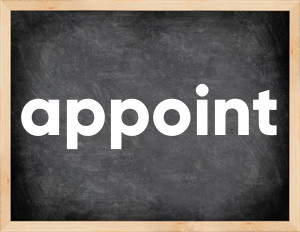 The English verb 'appoint' is pronounced as [əˈpɔɪnt].
The English verb 'appoint' is pronounced as [əˈpɔɪnt].
Related to:
regular verbs.
3 forms of verb appoint: Infinitive (appoint), Past Simple - (appointed), Past Participle - (appointed).
Here are the past tense forms of the verb appoint
👉 Forms of verb appoint in future and past simple and past participle.
❓ What is the past tense of appoint.
Appoint: Past, Present, and Participle Forms
| Base Form | Past Simple | Past Participle |
|---|---|---|
| appoint [əˈpɔɪnt] |
appointed [əˈpɔɪntəd] |
appointed [əˈpɔɪntəd] |
What are the 2nd and 3rd forms of the verb appoint?
🎓 What are the past simple, future simple, present perfect, past perfect, and future perfect forms of the base form (infinitive) 'appoint'?
Learn the three forms of the English verb 'appoint'
- the first form (V1) is 'appoint' used in present simple and future simple tenses.
- the second form (V2) is 'appointed' used in past simple tense.
- the third form (V3) is 'appointed' used in present perfect and past perfect tenses.
What are the past tense and past participle of appoint?
The past tense and past participle of appoint are: appoint in past simple is appointed, and past participle is appointed.
What is the past tense of appoint?
The past tense of the verb "appoint" is "appointed", and the past participle is "appointed".
Verb Tenses
Past simple — appoint in past simple appointed
(V2).
Future simple — appoint in future simple is appoint (will + V1).
Present Perfect — appoint in present perfect tense is
appointed
(have/has + V3).
Past Perfect — appoint in past perfect tense is
appointed
(had + V3).
appoint regular or irregular verb?
👉 Is 'appoint' a regular or irregular verb? The verb 'appoint' is regular verb.
Examples of Verb appoint in Sentences
- I appoint you to be in charge for the next few months (Present Simple)
- The government has appointed commission to monitor foreign investments (Present Perfect)
- They should appoint the exact time and place of the meeting (Present Simple)
- My brother is appointing his room (Present Continuous)
- I made a mistake when I appointed him to the position (Past Simple)
- Their assessment is the most important criteria for us, appoints gaps and the future direction of activities (Present Simple)
- I think we should appoint a new head of the surgery (Present Simple)
- Our parents have appointed us for the long journey (Present Perfect)
- She was the first woman to be appointed to a scientific position and to be paid for scientific work
- The next step in the project life cycle is to appoint the marketing working group (Present Simple)